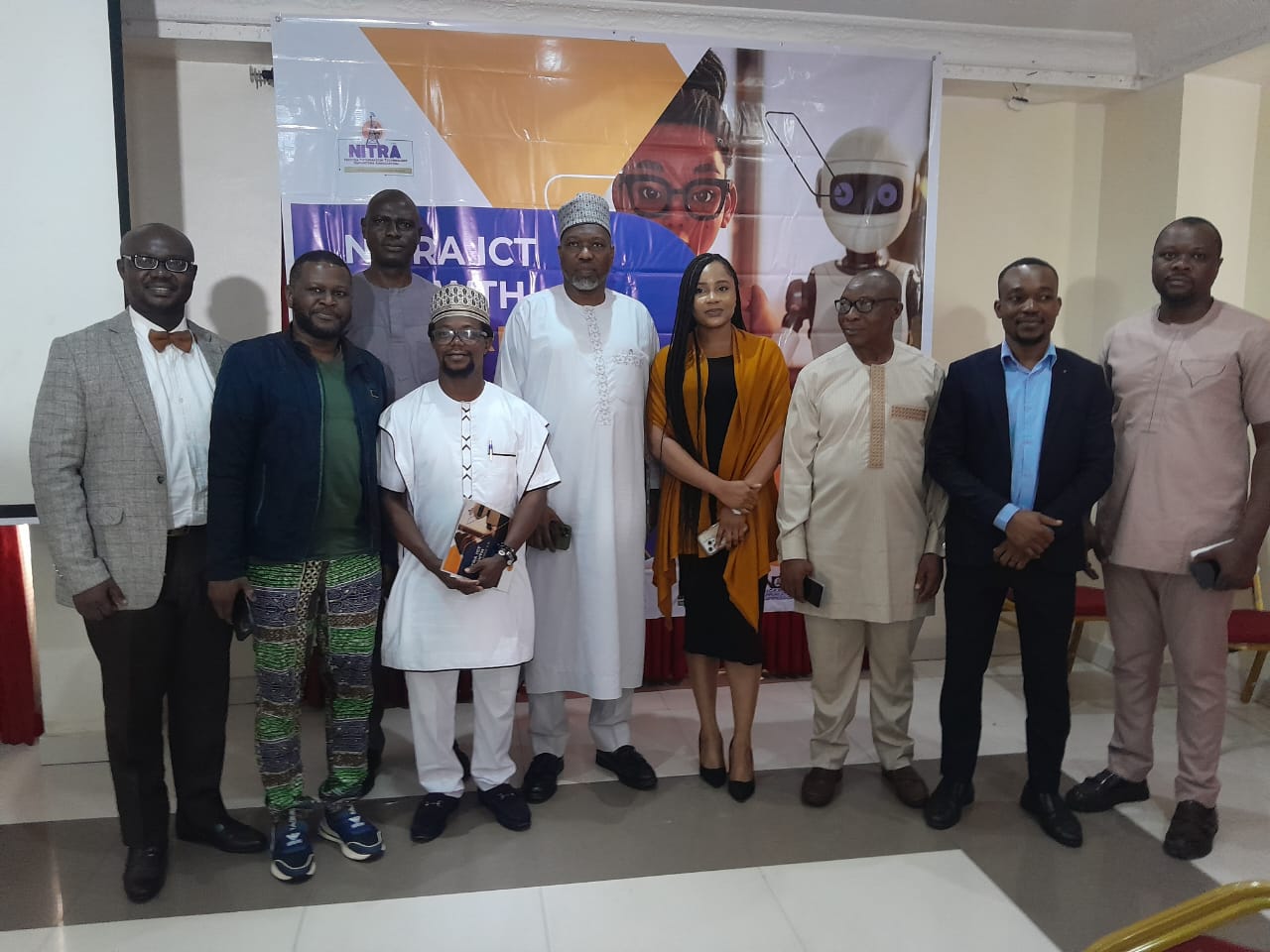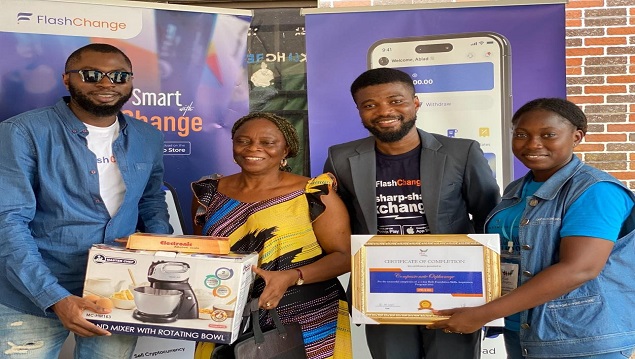General News
ICT Stakeholders Highlight Need for Sectoral Collaboration to Harness Benefits of AI

Mr. Adesola Akinsanya, President of the Nigeria Internet Registration Association (NiRA) and other stakeholders in the Information and Communication Technology (ICT) sector have underscored the need for collaborative efforts by opinion moulders in the sector to harness the benefits of Artificial Intelligence (AI) for economic growth.

A cross section of participants at NITRA ICT Growth Conference 4.0 with the theme: “Impact of AI on National Development: Prospects, Policies, and Challenges in Nigeria” held on Wednesday, August 28, 2024 at CitiHeight Hotel, Ikeja, Lagos.
The stakeholders stated this at the NITRA ICT Growth Conference 4.0 with the theme: “Impact of AI on National Development: Prospects, Policies, and Challenges in Nigeria” held on Wednesday, August 28, 2024 at CitiHeight Hotel, Ikeja, Lagos.
Speaking at the event, Mr. Akinsanya who was represented by Peter Oluka, member, Executive Board of Directors, NiRA emphasized that AI has the potential to drive economic growth, improve businesses and public services, as well as enhance the quality of life in Nigeria.
He hinted that realizing these benefits requires careful consideration of the prospects, the formulation of sound policies, and addressing the accompanying challenges.
According to him, “As AI continues to evolve, it’s potential to drive economic growth and improve businesses and public services, and also enhance the quality of life in Nigeria is immense”.
Adding that the complex challenges associated with AI cannot be solved by any single entity rather it requires partnerships, shared knowledge, and collective action that can drive the kind of growth that is inclusive, sustainable, and transformative.
Prof. Obadare Peter Adewale, Founder and chief visionary officer, CVO, Digital Encode, emphasized the need for Nigeria to understand the threat landscape and the critical role of cybersecurity in protecting against these threats.
Prof. Obadare represented by Mr. Oluwakayode O. Olatunji, CISO and Group Head of InfoSec & GRC Advisory, Digital Encode, underscored the importance of driving sub-sectoral digital growth through Artificial Intelligence (AI) while also decrying that many African countries lag behind in cybersecurity.
He further highlighted the potential of AI across various sectors, including finance, health, energy, transportation, defense, medical, and agriculture.
He underscored AI’s ability to predict productivity and its diverse benefits but quickly cautioned against the dangers of AI misuse, stemming from issues such as bias and fairness, security vulnerabilities, data privacy concerns, and ethical and moral dilemmas.
The cybersecurity expert discussed the use of AI in threat landscape profiling, crime detection and prevention, and reporting capabilities.
He stressed the importance of responsible AI usage and the need for continued investment in AI and cybersecurity.
Earlier, Mr. Chike Onwuegbuchi, Chairman, Nigeria Information Technology Reporters Association (NITRA) was displeased with the abysmally low adaptation trend by Nigerians to new technologies.
He urged stakeholders in the sector to lay more emphasizes on technology adaptation, adding that the country is number one in the usage of internet in Africa but lags in connectivity and internet penetration.
According to him, “There has been a known trend in Nigerians’ adaptation of new technology, where usage is higher than implementation.
“For instance, we are number one in the usage of internet in Africa but lags in connectivity and internet penetration.
“Artificial Intelligence has followed the same trend, Google search trends reported recently that searches for artificial intelligence (AI) have continued to rise around the world, with Nigeria experiencing a 130% increase in 2024.
He called on relevant ICT stakeholders in the sector to collaborate with government agencies to fashion out / design a curriculum for school to ensure that the study of AI is included in secondary schools.
He also warned that we should avoid the ugly trend / situation where for instance most students of computer science in our higher institutions do not have the opportunity to have a hands-on experience with a physical Computer throughout their duration in school.
Dr. Oluseyi Akindeinde, founder of Hyperspace and NeuRal AI, highlighted AI’s challenges and opportunities, reassuring that AI will enhance human capabilities, not replace them.
He showcased AI applications in transcription, translation, and education, demonstrating its potential to drive innovation and inclusive development.
A panel discussion composed of representatives from the NCC, private sector, and media and moderated by Mr. Hillary Damissah, explored how to navigate AI’s dangers in a developing economy.
They emphasized the need for policy frameworks, regulation, and collaboration to mitigate AI’s negative effects and ensure its benefits are equitably distributed.
The conference underscored AI’s significance in Nigeria’s development, urging stakeholders to work together to create an environment conducive to innovation, research, and tech adoption.
As AI continues to evolve, Nigeria must prioritize strategic planning, ethical considerations, and inclusive growth to harness its full potential.
General News
FG to Introduce New Tax Credit Scheme to Replace Pioneer Status Incentive

As part of Nigeria’s ongoing tax reform efforts, the federal government is proposing a new investment-driven incentive framework aimed at addressing long-standing inefficiencies in the current Pioneer Status Incentive (PSI).

The new scheme, known as the Economic Development Incentive (EDI), is designed to stimulate real economic activity by tying tax relief directly to verifiable investments.
This was the focus of a keynote address delivered by Taiwo Oyedele, Chairman of the Presidential Committee on Fiscal Policy and Tax Reforms, at BusinessDay’s Policy Intervention Series held on April 22 in Lagos.
According to Oyedele, a close review of the Pioneer Status Incentive revealed structural flaws that have undermined its effectiveness. “Once granted Pioneer Status,” he said, “companies may import goods classified as ‘pioneer products’ tax-free, effectively allowing them to operate without tax obligations—even with minimal value addition to the economy.”
He further noted that while the PSI was initially designed to encourage investment, it created loopholes and ambiguities. For example, businesses often benefit from extended tax relief even after the designated holiday period ends.
“The assets used during the Pioneer period are essentially frozen in time,” Oyedele explained. “They’re treated as if acquired after the incentive ends—meaning companies only start claiming deductions once the holiday period is over. This creates long-term tax advantages that go well beyond the policy’s original intent.”
He also pointed out that the PSI makes it difficult for the government to quantify revenue forgone and for investors to clearly assess the value of the incentive—undermining transparency on both sides.
The Economic Development Incentive
The proposed Economic Development Incentive is a departure from the one-size-fits-all model. Instead, it’s structured around priority sectors—primarily manufacturing, followed by services and infrastructure—that have strong multiplier effects on the economy.
Another key design feature is the introduction of minimum investment thresholds to ensure only scalable and impactful projects qualify. For instance, companies operating in capital-intensive sectors like utilities would need to invest at least N200 billion to be eligible for the tax credit.
“The EDI is about real impact,” Oyedele said. “It’s time-bound, sector-targeted, and tied to actual capital deployment—not just approval on paper.”
Unlike blanket tax holidays, the EDI grants companies a 5 percent annual tax credit over five years—totaling 25 percent of the value of their qualifying investment. Importantly, this is in addition to existing capital allowances, making the scheme particularly attractive to long-term investors.
Crucially, approval under the scheme does not mean the investment has already been made. It only confirms that the company has a verified plan. The incentive kicks in only after capital is actually deployed, and all investments are subject to inspection by the Industrial Inspectorate Division.
Oyedele broke down how the system works using practical examples:
If a company invests N10 billion in Year 1, it earns a N500 million tax credit each year for five years. If an additional N5 billion is invested in Year 2, that new investment begins its own five-year 5 percent cycle—N250 million annually until Year 6.
If the company continues investing progressively, each round of investment starts a new five-year cycle of tax credits, potentially extending the benefit period up to 10 years.
For instance, if a business has a N15 million tax liability in a given year and applies N25 million in tax credits, its liability is wiped out entirely, with the N10 million balance rolled over to subsequent years.
However, there’s a catch: if a company fails to follow through on its investment plan or halts capital deployment, unused credits are forfeited. This accountability mechanism ensures that only consistent and credible investments are rewarded.
General News
FlashChange Partners Ruth Foundation to Empower Vulnerable Children in Alimosho with Skill Acquisition

In an inspiring initiative to uplift the next generation, FlashChange and Ruth Foundation have successfully implemented the “Orphanage Skill Acquisition Assembly 2.0 program,” a skills empowerment program for vulnerable children in Alimosho, Local Government Area of Lagos state.

The five-day programme, which began on Monday, April 14, was created to equip vulnerable children aged 4 to 18 years with essential life skills such as financial literacy, fashion design, photography, creative arts, cooking, and leadership development
Speaking at the closing ceremony of this year’s edition of the programme, the Chief Operating Officer, Flashchange, Olamide Ajibola said, “We are delighted to be part of this life-changing initiative.
“At FlashChange, we believe that children are the heartbeat of every community, by investing in their development today, we are not just shaping the future of individuals but nurturing future leaders, creators, and change-makers that would make a positive contribution to the growth and development of the society in the near future.”
“Initiatives of this nature gladdens our heart and we are open and willing to participate in them at any time. In the coming months, we hope to do more in that area as our own little way of improving society. This is in line with our CSR pillars, which include human capital development.”
Ajibola appreciated the benefitting children for accepting to be part of the life changing training which has the capacity to catapult them to a brighter future. The facilitators were also commended for impacting the children with the skills and knowledge to help shape their lives.
The founder Ruth Foundation, Itunuoluwa Ruth Da-Silva, in her remarks, expressed the foundation’s deepest appreciation to partnering organizations like FlashChange for believing in the vision and throwing their full weight behind it.
She said, “It will interest you to know that 153 vulnerable children benefitted from the Orphanage Skill Acquisition Assembly 2.0 programme and the training ran simultaneously at Compassionate Orphanage home; Precious Pearl Orphanage; Little Saints Orphanage and House of Mercy Orphanage respectively. Providing the children access to knowledge and skills early in life to create a ripple effect that can transform the entire community.”
The Chief Marketing Officer, FlashChange Jesujoba Ojelabi commended Ruth foundation for the initiative and urged the children to take the skills learnt seriously, as it has the capacity to change their lives for good.
He said, “As a company, we would be proud to lend our support to the foundation whenever we are called upon to do so in the future. My candid advice to you children would be this, to be great ambassadors of this initiative, you need to continuously put to practice the skills and knowledge you have acquired from the programme. We are indeed proud of you all and the success stories recorded so far.”
To support the continuous development of the children the following items were donated; electric sewing machine, cake mixer; packs of Yeye yarn, packs of pins, some stitch markers, scissors, measuring scale, make-up kit box filled with make-up tools among several others.
FlashChange and Ruth Foundation therefore urge community leaders, government organizations, private sector partners, and stakeholders to support programmes of this nature aimed at equipping children with the skills they need to thrive in a world that is evolving quickly.
General News
EFCC Clarifies SCUML Certificate Misuse amid CBEX Ponzi Scheme Scandal

Economic and Financial Crimes Commission, EFCC, has dismissed the claims that the defunct digital asset trading platform, CBEX, was registered with its Special Control Unit against Money Laundering, SCUML.

However, EFCC stated that ST Technologies and not CBEX registered with SCUML, saying that the certificate didn’t imply clearance by the Commission.
The clarification comes after Lesley Kessy Oviritsa, one of the victims of the CBEX Ponzi Scheme said she fell prey to CBEX after seeing and verifying its CAC and SCUML Certificate.
Oviritsa claimed they had no reason to suspect foul play, especially since they claimed their SEC certificate would be ready by May 2025.
Nigeria CommunicationsWeek reported how CBEX swept over N1.3 trillion from their investors’ accounts.
In a post on its official handle on X on Monday, EFCC said the Commission is not a clearing house or regulatory authority of online businesses.
The post read: “SCUML Certificate Is Not CLEARANCE BY EFCC.
“ST Technologies (not CBEX) registered with the Special Control Unit against Money Laundering, SCUML in line with Section 17 of the Money Laundering, (Prevention & Prohibition) Act, 2022.
“Registration is a statutory requirement for all Designated Non-Financial Businesses and Professions, DNFBPs, in Nigeria in consonance with Nigeria’s Anti-Money Laundering/ Control of Financing Terrorism, AML/CFT regime.
“The EFCC is not a clearing house or regulatory authority of online businesses.
“But financial fraud of any kind is the remit of the Commission, and it is committed to ensuring justice for victims of the CBEX scam.”

 Telecom3 days ago
Telecom3 days agoMTN Nigeria Takes Broadband Services to the Next Level with FibreX Launch

 Telecom2 days ago
Telecom2 days agoDigital Transformation Remains Africa’s Gateway to Economic Advancement – Adumike

 News3 days ago
News3 days agoSERAP Files Lawsuit Against NBC Over Ban on Eedris Abdulkareem’s Protest Song Tell Your Papa

 Telecom2 days ago
Telecom2 days agoPAFON 2.0: Experts Discuss Pathways to Boost Financial Inclusion in Nigeria

 General News2 days ago
General News2 days agoEFCC Clarifies SCUML Certificate Misuse amid CBEX Ponzi Scheme Scandal

 E-Financial2 days ago
E-Financial2 days agoCBN, NGX Group Defend Economic Reforms at Nasdaq

 E-Financial3 days ago
E-Financial3 days agoFCMB Group Redefines Corporate Storytelling with The Power Of The Group TVC

 Telecom22 hours ago
Telecom22 hours agoMTN Nigeria Faces Class Action Lawsuit over Alleged Data Mismanagement




























